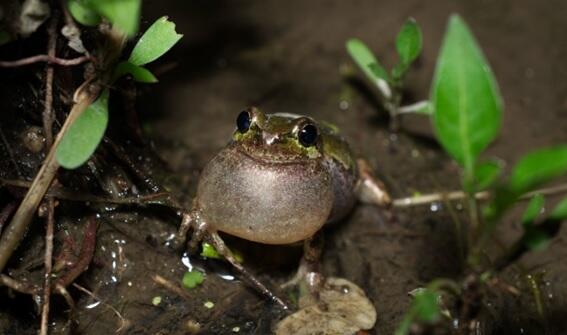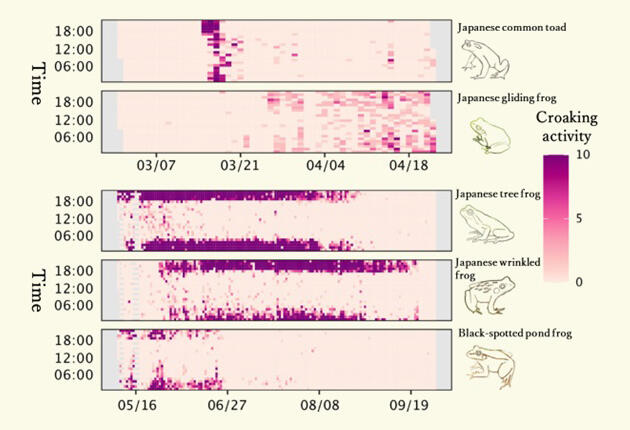A research group led by Graduate Student Kaede Kimura and Professor Emeritus Teiji Sota of the Graduate School of Science at Kyoto University announced that they have established an artificial intelligence (AI)-based method to automatically identify frog calls and monitor their reproductive activity. The AI, which learned the croaking sounds by means of a convolutional neural network (CNN; a type of deep learning), was able to discriminate five species of frogs that appeared at the study site, achieving a high accuracy of more than 90%. When frogs were counted almost every day at the research site, it was confirmed that the number of frogs that appeared was higher on days when the index of vocal activity was higher. This method is expected to be used for the acoustic monitoring of frogs in field surveys and the results were published on November 17, 2023 in the American international academic journal Ichthyology & Herpetology.

Provided by Kyoto University
Acoustic monitoring using sound recorders is widely used in habitat surveys, because it is more efficient to listen for actively chirping frogs that gather at water bodies during the breeding season than to visually look for them. However, the analysis of huge amounts of data has become a challenge. Although the use of AI was expected, it was unclear whether this technology would be able to accurately distinguish the chirps among a complex field recording full of sound.
From this background, the research group used a CNN model to examine whether it was possible to identify the calls of the five species of frogs that appeared in the survey area.
To record frog calls during the breeding season, recorders were set up at two locations in the mountains: a small pond and a paddy field. Approximately 2,700 short audio clips were extracted from the recordings, labeled according to the frog species, and then used as training data to train the AI. As a result, the AI was able to identify calls with 90−100% accuracy and 75−98% sensitivity, depending on the species.
The low sensitivity of 75% for the black-spotted pond frog was presumed to be due to the fact that its calls were drowned out by the much larger population of Japanese tree frogs, making detection difficult.
AI analysis of the recorded data revealed that Japanese toads breed en masse for only a few days in early spring, whereas Japanese tree frogs and wrinkled frogs breed over several months during the summer nights, indicating that different species have very different breeding patterns.
Based on the observable rule that the chorus does not stop singing throughout the night on days when the frog population is high, the group defined an index of singing activity on the basis of the length of time singing was detected and compared it to the numbers of male individuals and female−male pairs. The results showed that for most species, the singing on any given day was more active when the numbers of males and pairs were higher. However, it was also found that the correlation between the number of pairs and calls was relatively weak.
Using this method, one can simply set up a recorder and observe detailed reproductive activity over a wide area through sound, something that was previously impossible.

Provided by Kyoto University
Kimura said, "I was surprised that when I used the AI myself, it identified the frog species more accurately than I had imagined. Frogs are declining in number throughout the country, and many species are listed as endangered. We hope that this research will serve as a foundation for the use of AI to monitor habitat conditions."
This article has been translated by JST with permission from The Science News Ltd. (https://sci-news.co.jp/). Unauthorized reproduction of the article and photographs is prohibited.




